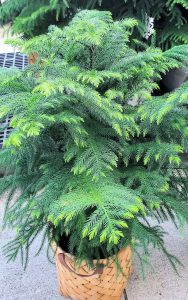
If you want a small “living” table- top Christmas tree for the Holidays, the Norfolk Island pine will likely fit the bill. Easy to maintain for many years in a container, the Norfolk Island pine (a conifer, but not really a true pine) is the perfect Holiday gift and an ideal decorative interiorscape specimens.
The Norfolk Island pine is native to Norfolk Island in the South Pacific just east of Australia. These evergreen trees develop a single trunk and can grow up to two-hundred feet tall in nature. In cultivation, there is something endearing about the small seedlings that are seen at garden centers and florists at this time of year. Pyramidal in shape with soft looking, dark green, needle-like leaves, Norfolk Island pines look like miniature versions of our more familiar fresh cut traditional conifers. They will also tolerate small bulbs, tinsel and bows when decorated for the Christmas season. After the Holidays, remove the decorations and use these trees as subjects for patios, pool cages, and Florida rooms year-round as floor plants. With proper care, Norfolk Island pines can live for a long time as a house plant for both indoor and outdoor environments. It is very important, however, that you are careful not to over-water or over-fertilize. Over-watering, as well as excessive dry air caused by indoor environments, will cause potted Norfolk Island pines to drop the lower foliage. Norfolk Island pines prefer full sun but can also tolerate bright indirect light indoors. An acid, fertile soil mixture is recommended as a potting medium making sure that the pot has good drainage. Containerized plants should be fed with most any liquid fertilizer at normal strength once every two weeks or according to label instructions during the active growing season. Although Norfolk Island pines have weak root systems and do best on the pot-bound side, repotting every four years or so may be required. If they become a bit leggy or droopy, a stake may be needed for support. Norfolk Island pines are slow-growing, and you may only have a five to eight-foot specimen after ten years of growth.
Eventually, these plants will outgrow their useful size to a point where most people will not want to deal with them. Once your plant gets too big for a normal-sized pot, please don’t be tempted to plant it out in the yard unless you have a great deal of room – these trees can get over fifty feet tall! They are not invasive but can eventually outgrow your landscape site. While you do see these trees dotting our landscape, keep in mind that they have large surface roots and are known to uproot in storms – especially hurricanes. And speaking of hurricane damage, you will notice the results suffered by many specimens in our local landscapes post-Ian. While in time, many wind-damaged Norfolk Island pines can recover, a good amount end up looking like giant pipe cleaners with greatly reduced ornamental value. This plant really does not produce much shade and the trunk tends to curve and lean as it grows to an enormous size. The great height of Norfolk Island pines also makes them candidates for lightning strikes.
The Norfolk Island pine has become a regular feature of our Christmas Holiday plant selections – enjoy them for many seasons to come! For more information on all types of Holiday plants, you can also call the Master Gardener Volunteer Helpdesk on Mondays, Wednesdays and Fridays from 1 to 4 pm at 764-4340 for gardening help and insight into their role as an Extension volunteer. Ralph E. Mitchell is the Director/Horticulture Agent for UF/IFAS Extension – Charlotte County. He can be reached at 941-764-4344 or ralph.mitchell@charlottecountyfl.gov. Connect with us on social media. Like us on Facebook @CharlotteCountyExtension and follow us on Instagram @ifascharco.
Resources:
Gilman, E. F., Watson, D. G., Klein, R. W, Koeser, A. K., Hilbert, D. R. & McLean, D. C. (2018) Araucaria heterophylla: Norfolk Island Pine. The University of Florida, IFAS.
Brown, S. H. (2011) Norfolk Island Pine Recovery from Hurricane Charley – https://gardeningsolutions.ifas.ufl.edu/pdf/articles/norfolk-island-pine-stephen-brown.pdf . The University of Florida, IFAS – Lee County
Source: UF/IFAS Pest Alert
Note: All images and contents are the property of UF/IFAS.



